Secrets to Happiness for Every Myers-Briggs® Personality Type
Does happiness have anything to do with your Myers-Briggs (MBTI®) personality type? While no type is inherently happier than another, each type has activities and perspectives that tap into their talents and bring them immense joy and meaning.
Today we’re going to explore some of the things that create a sense of joy and fulfillment for each personality type.

Not sure what your personality type is? Take our new personality questionnaire here. Or you can take the official MBTI® here.
This article contains affiliate links to books on Amazon. If you purchase one of these books, I get a small kickback that I can use to pay for hosting and other demands of this site. I only recommend books I love.
Table of contents
Estimated reading time: 12 minutes
Secrets to Happiness for Every Myers-Briggs® Personality Type
The ENFP
For you, happiness is found when you shake off the expectations of others and get deeply in tune with your core purpose in life.
Take time to breathe in new possibilities, and get in touch with your true convictions and path in life. Meditate. Imagine. Travel. Read poetry, autobiographies, and fantasy books. Make one or two promises to yourself and trust that you’ll keep them – but give yourself the opportunity to explore first.
You can explore by talking to people from many different walks of life, traveling to new cultures, reading a variety of books, trying a variety of tasks. As you explore, make note of what “fills” your soul, and what drains it. Love yourself enough to give yourself this chance to experiment and discover without being chained to the traditions and expectations of others.
The ENTP
For you, happiness is found in discovering the potential of something. It’s brainstorming with a variety of interesting people or staying up all night solving a complex problem that stumped everyone else.
Anytime you sense that the boundaries of your mind are shifting ever-so-slightly wider, you feel a sense of contentment that is unmatchable.
In order to find these moments, you need to challenge yourself (something you naturally love). Take on a project that terrifies you, look at something in your immediate vicinity – what could you do with it? How could you change it to make it better? Do something unexpected (but safe) today. Surprise yourself!
The INFP
As an INFP, you derive happiness from putting your unique stamp on a creative project. Whether you’re drawing a picture and experimenting with colors to create something unique, or pouring your imagination out onto the written page – happiness is creating something that’s never been made before. The key is it needs to feel meaningful and authentic to you.
For some INFPs, creative, soul-extracted joy is found in the artistic, while others find this joy in cooking, teaching, entrepreneurship, or even home renovation! Tapping into your creativity and imagination is essential in order for you to feel fulfilled. Bonus happiness points if your creativity is in service of a cause that is important to you.
Read This Next: 10 Things That Excite the INFP Personality Type
The INTP
As an INTP, it’s essential for you to have a variety of projects that entertain your mind and spark your curiosity.
You find happiness in decoding the mysteries of the universe, learning how things work, and imagining new possibilities. Having a stimulating intellectual debate can also make you happy! Swapping ideas, insights, and looking for loopholes is exciting and inspiring to you.
Your natural “headiness” as an INTP can sometimes lead you to become out of touch with your physical world, though. Try to make time for movement and nature. Make sure you’re drinking enough water (set reminders on your phone if you have to!). I’ve known several INTPs who accidentally sabotaged their happiness by letting their physical health decline in pursuit of intellectual goals.
The ENFJ
For you, happiness is found in seeing human potential and inspiring that potential to be realized.
Is there someone that you feel has a unique ability or gift? Connect with them! Call them up and let them know what you see, or send them a text if that is more comfortable for you.
Authentic, deep human connection builds up your contentment and satisfaction in life. Combine human interaction with other activities that boost happiness levels.
For example, go on a daily jog with a friend, have a comedy movie night (complete with fun snacks) with someone you love. When you’re alone find activities that build your inspiration and sense of the potential. Listen to songs that inspire you, read books that add depth to life’s meaning, meditate, or journal.
The ENTJ
Achievement and goal-completion give you a sense of satisfaction and contentment. You thrive when you can see progress being made on your objectives, and when you have a sense that you’re growing and becoming wiser as a person.
One thing to keep in mind is that while growth is satisfying, sometimes you can be so fixated on it that you forget to appreciate where you are now.
Take a moment to look around you. How miraculous is it that life has given you all the things you have right now?! If you were at the end of your life and could time travel back to this moment, what would you appreciate?
It sounds cheesy, but pausing to appreciate the blessings you have can greatly add to your happiness. Spending time outside can also increase your overall well-being. Listen to a thought-provoking audiobook while you walk outside in the morning. Have a work-related meeting outdoors and soak in the sunshine and fresh air. At the end of the day, think of all the things you’ve discovered and learned, and dwell in that gratitude as you fall asleep.
The INFJ
Your sense of happiness arrives when you find your part to play in the grand plan of the universe. Finding meaning, purpose, and direction is essential for your sense of well-being. But finding this can be hard. You may spend so much time lost in deliberation and hoping for it that it seems forever out of reach.
Often the path towards your grand plan and sense of purpose comes when you try things even if they may not succeed. Do one random act of kindness today, write one chapter in a book you’ve been putting off writing, find a small “adventure” you could pursue. Tell yourself that you are good just as you are – that you don’t have to change for everyone around you.
Sometimes as an INFJ, you can feel like you’re “not enough,” or like you’re so different that nobody could possibly understand you. This can stop you from believing in yourself enough to take that next step towards your goals. Give yourself permission to experiment, explore, make mistakes, and to love yourself exactly as you are right now.
Read This Next: 3 Weird and Wonderful Secrets of the INFJ Personality Type
The INTJ
For you, a sense of happiness comes when you have the freedom to imagine and achieve your greatest goals. In quiet and stillness, you can let your mind ponder and analyze your direction in life. You can spark your curiosity and sense of wonder by reading philosophical books or playing a solo strategy game.
You want to be intellectually challenged, but you also want to achieve something tangible in the real world. Often, you’re happiest when you “swallow the frog” first thing in the morning, finishing your most challenging task before you go on with your day. This sense of achievement frees you mentally to explore, create, and discover new things as the day goes on. Regular exercise also helps to stimulate your mind and give you fresh insights into problems you may be facing.
Read This Next: 10 Things That Excite the INTJ Personality Type
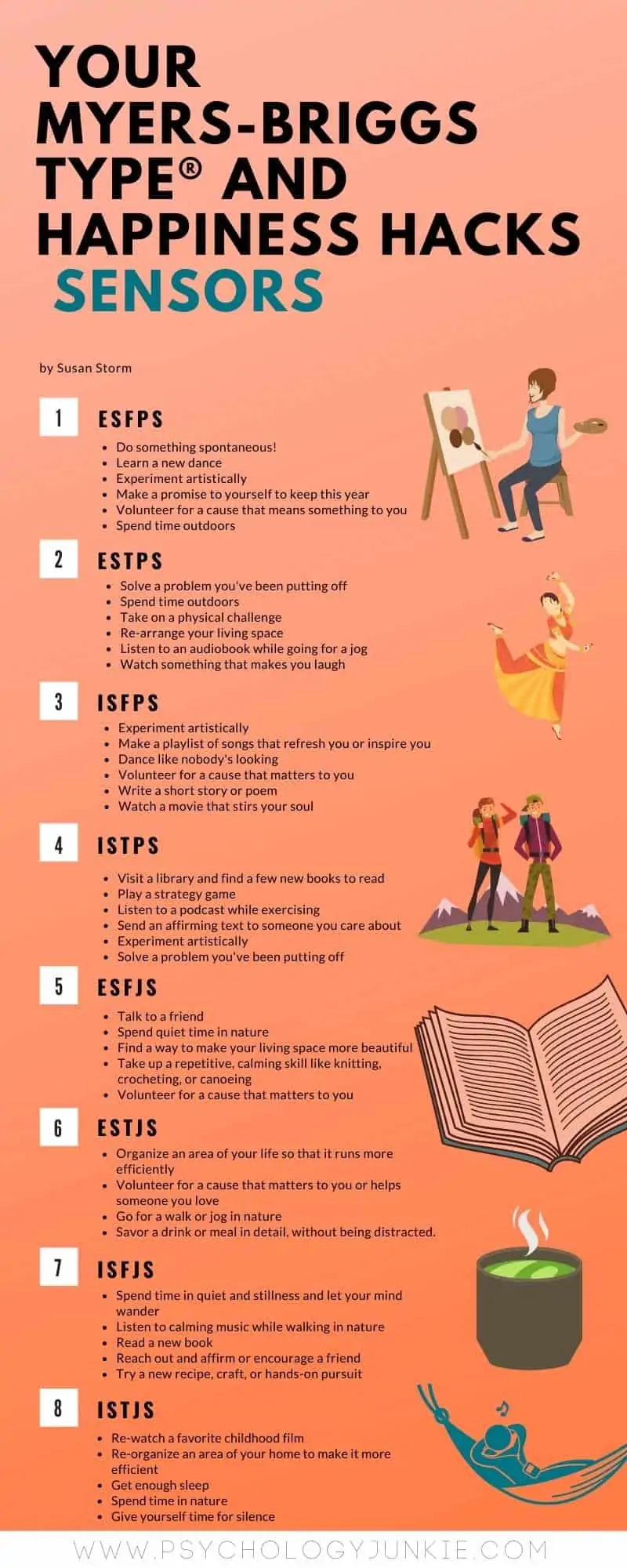
The ESFP
As an ESFP, you get a sense of happiness and contentment when all the details in your life are taken care of so that you can be free to pursue adventure and happiness spontaneously.
You enjoy meeting life with a sense of readiness and enthusiasm for whatever opportunity might present itself. Spontaneous travel, pancakes in the middle of the night, kisses in the pouring rain, impromptu comedy performances. A sense of the unexpected and surprising fills your spirit with joy – you crave the sense that in this life anything could happen and anything is possible.
The ESTP
You get a sense of happiness when the boundaries and rules in your life loosen their grasp and you experience something that makes you feel free.
Spontaneity, excitement, and action are all things that you need on a regular basis. Whether that means unexpectedly hitching a train to anywhere or randomly throwing a party with your closest friends, an exciting surprise gives you the sense that life is worth living.
Being outdoors and active on the regular is also crucial for your sense of well-being. You enjoy exercising outside to boost your endorphins and fill your lungs with fresh air. You’re the type who picks challenging recreational activities; mountain climbing, whitewater rafting, parkour – all these things sound thrilling to you.
The ISFP
You get contentment from living a life that lines up with what’s important to you on a soul level. Finding your purpose and living in alignment with it drives you.
Exploration and freedom are also major satisfiers for you. Having an open-ended schedule and the freedom to explore the world and your own emotions is tantalizing. Like the feeling on a Friday night when the whole weekend lies before you unplanned, untouched, and ready for you to fill with your own random desires and pursuits.
You also gain a sense of meaning when you can make a tangible difference for a cause that’s important to you. Sometimes that means volunteering at an animal shelter, or it could mean creating an artistic expression that conveys one of your deeper emotions.
The ISTP
Happiness fills your soul when you are free to pursue your own independent hobbies and interests. You crave a sense of autonomy in the world, and when you’ve gained it, you can finally relax and let yourself breathe.
This doesn’t mean that you don’t want any friendships or relationships, you just prefer them with people who also understand your need for freedom.
Driving aimlessly while listening to your favorite music, jogging along the beach at night when everyone else has left, locking the door to your room so you can read a book or play a computer game. All these things give you a sense of contentment and joy.
Of course, you still enjoy deep, meaningful relationships with loved ones. You get a sense of purpose when you can help someone you love in a tangible way; by fixing something for them or giving them a thrilling experience they’ve never had before.
The ESFJ
You get a sense of happiness and joy when you can connect with someone in a raw, authentic way. When the walls crumble and there’s a sense of transparency and depth that goes beyond small talk and surface-level details.
Sure, you like small talk, but generally as a prelude to more meaningful, personal discussions.
You also gain a sense of contentment from knowing everything in your life has a place, a time, and a sense of order. Having an organized environment, a clear routine, and some soul-filling moments scheduled into your day is crucial to you.
For some ESFJs this will mean sitting on the porch and watching the sunrise while sipping their favorite brand of coffee every morning. For other ESFJs this might mean reading a chapter from a book over Zoom with a long-distance friend every evening. You like a sense that there’s a rhyme, rhythm, and flow to life and you’re free to experience harmony with others along the way.
The ESTJ
A sense of order, structure, and success in life helps you to feel happy and content. You like knowing that you’re progressing every day towards your goals and that the details in your life (bills, healthcare, home and family life) are in order and tended to.
At the same time, regular doses of laughter, spontaneity, and silliness give you true joy. You work hard, but you also thrive when you play hard.
Spending time outside, living close to friends that matter to you, having a comedy movie night and laughing with your spouse while you enjoy your favorite snacks. These relaxed, lighthearted moments help you to feel a sense of peace and contentment that many may not realize who only see your productive side.
The ISFJ
You find joy in a life that is meaningful yet stable. A sense of consistency and security gives you the freedom to pursue your individual ideas and activities.
You like having everything in its place, an order for everything, and a sense of peace surrounding your daily routine. A clear structure gives your life a sense of continuity and purpose. When everything is taken care of, you can let your mind and body relax. You can let your thoughts wander. You can explore the significance of things you might not otherwise have noticed.
Spending regular time outside, and having nourishing phases throughout your day where you take care of your senses is crucial for your well-being. Sometimes this means drinking a mug of hot tea while listening to classical music, sometimes it could mean doing yoga in your backyard at sunrise. Giving yourself regular pauses throughout the day to attend to your physical and emotional needs is vital for your happiness.
Read This Next: 10 Things You’ll Relate to if You’re an ISFJ
The ISTJ
As an ISTJ, you find a sense of joy in creating stability for yourself and your loved ones. You want the people you love to know that they can count on you. You want to know that your schedule has been tailored so that your needs are met, and you also have time to be alone and explore your own interests.
It’s the little things that bring you joy, like re-watching a favorite childhood film, leisurely perusing a library, or learning everything you can about a hobby that strikes your interest (gardening, music, technology, etc,.)
Making that final check-mark on your to-do list signals to you that now you can explore your hobbies and interests without distraction or outside pressures. On top of this, keeping your body healthy, getting adequate sleep, and having one or two close friends who you can be yourself around is essential.
What Are Your Thoughts?
Did you enjoy this article? Do you have any thoughts or experiences to add? Let us know in the comments!
Find out more about your personality type in our eBooks, Discovering You: Unlocking the Power of Personality Type, The INFJ – Understanding the Mystic, and The INFP – Understanding the Dreamer. You can also connect with me via Facebook, Instagram, or Twitter!

Subscribe to Our Newsletter

Want to discover more about personality type? Get the inside scoop with Susan Storm on all things typological, along with special subscriber freebies, and discounts on new eBooks and courses! Join our newsletter today!


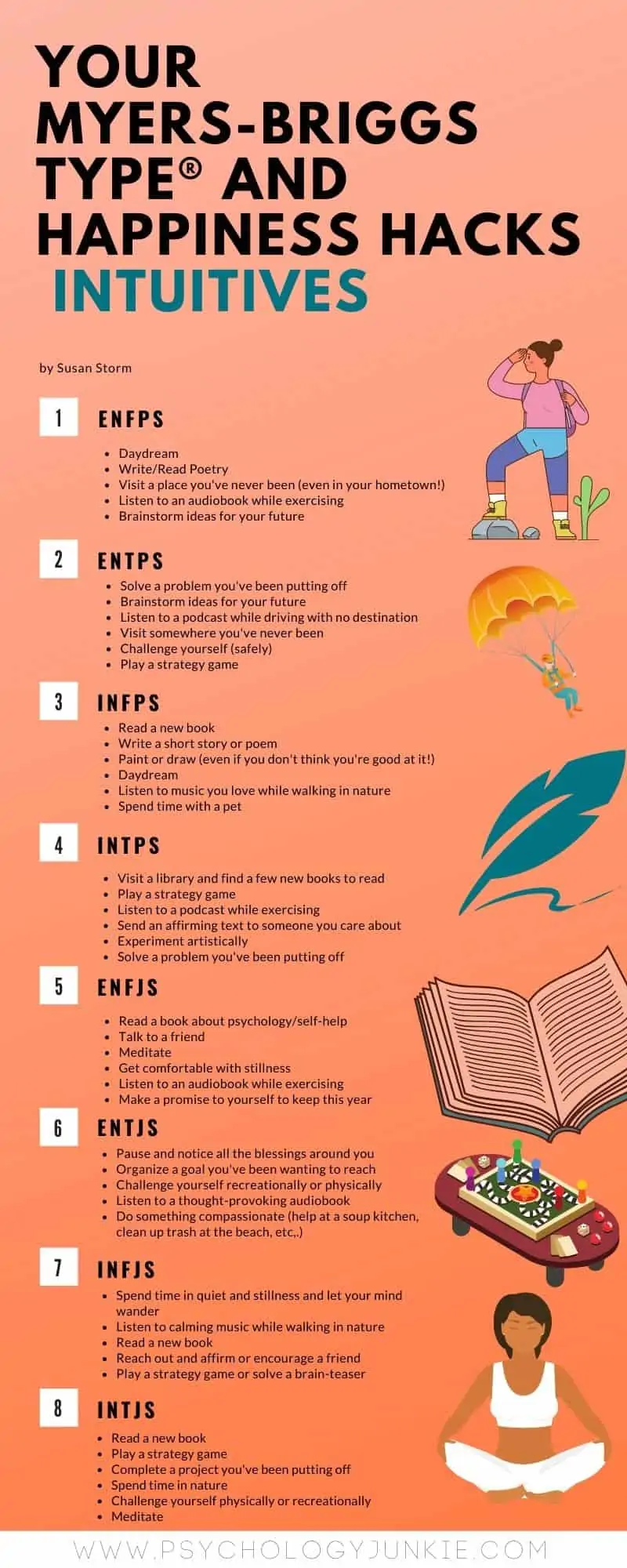






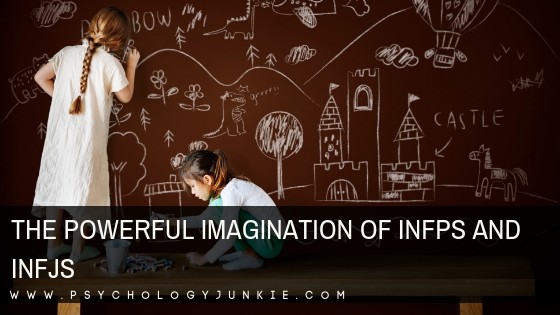


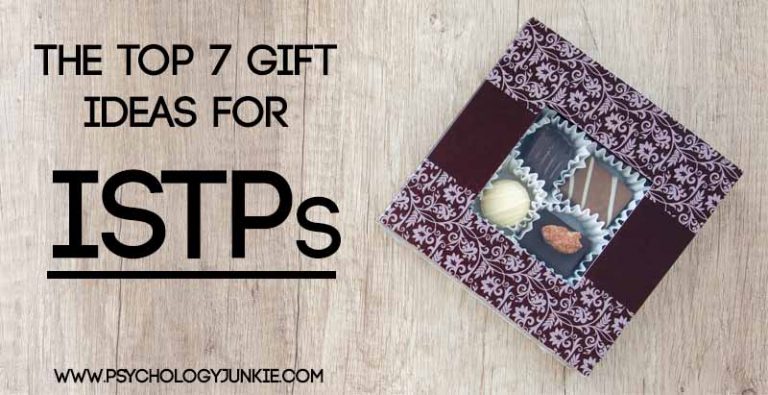
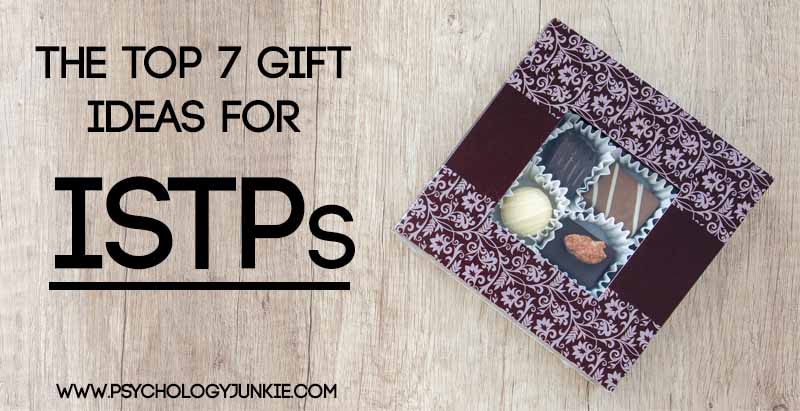


Great post Susan!
Thank you!!
Hi Susan, as a fellow passionate personality advocate, I love reading your articles
.
Thank you for sharing your wonderful, insightful work.
Take care
Kate
Thanks so much Kate! This means a lot to me 🙂
I love your blog! INFP here. ^.^
MBTI certified myself just two months ago and just started a Youtube channel “INFPhilosopher.” You are one of my inspirations along with Isabel Myers, Linda Berens and Personality Hacker.
Thank you so much!! This makes me so happy 🙂 I will definitely check out your YouTube page!
Thanks so much, Eric!!
Please do an article on how each personality type experiences grief and bereavement.
As an ISTJ it’s frustrating to not count with a truly friend. Great post! Thank you.
Love this article and the infographic, very helpful!
Thank you!!
I read all your articles Susan. I love the way you structure them. So efficient. I am ENTP trying to find ways to quit my government job and start a business or self employment. There are not many articles on that particular theme, which i feel is a very common theme among ENTP people. The things that ENTP love rarely if ever can be found in corporate or governmental jobs. So anyway, i would love to read/watch interviews with ENTP professionals who made this transition successfully. If anyone can provide a relevant link, please do. Thank you and keep up the inspiring work Susan.
I would love to interview ENTP entrepreneurs! That’s actually something that’s been on my list of ideas for a while so thank you for reminding me of it 🙂
Fascinating insights! ENFP here. Permit me to both acknowledge, and appreciate, the effort that you put into your work – t’is both engaging and informative! Kudos!
Thanks so much Kahmed!!